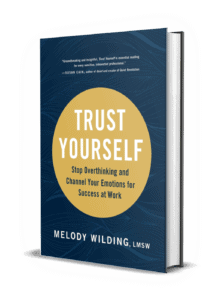When you’re at the top of your professional game mental maintenance is more critical than ever.
Throughout the workday, you go-go-go, wringing your brain dry of creativity and intellectual agility by the end of the day. Then you recharge overnight, and get back at ‘em the next morning.
The thing is, your mind is like a muscle: it requires careful maintenance or it’ll eventually be pushed beyond its limit and you’ll be susceptible to injury (including burnout, depression, anger, and lots more).
Same thing with your emotional wellness; it’s not an inexhaustible resource.
You wouldn’t skip out on changing your car’s oil or neglect to install the latest iPhone software patch. Isn’t your personal well-being even more important to you?
How, then, do you keep your brain and emotional state fine-tuned for peak performance?
So much generic self-care advice is pretty much out of the question for the average, hard-working person. Calling out of work for a “spa day”? Not gonna happen. Running five miles before work every morning? Not that either. And you can only take so many unplugged vacations per year. The fact that you can’t afford or make time for taking care of yourself can end up making you feel even worse.
Scheduled Mental Maintenance
One much more realistic approach is to conduct regular scheduled mental maintenance on yourself. It has the added benefit of being preventative, rather than reactive – keeping your performance and productivity consistently high rather than trying to repair after overworking. Like with any complex machine, you need to keep your mind well-oiled and your inner resources fully charged while you’re still under warranty (i.e., before it’s too late and you’ve burned yourself out).
But what exactly does personal scheduled mental maintenance look like?
It’s the practice of incorporating regular restorative activities into your routine, from a cathartic belly laugh that shifts you back into a positive place to a programmed cry that resets you emotionally.
As ABC News’ Dan Harris describes it, referring to another fruitful personal maintenance activity, “Meditation is going to join the pantheon of no brainers like exercise, brushing your teeth and taking the meds that your doctor prescribes to you. These are all things that if you don’t do you feel guilty about.” Tending to the upkeep of your emotional reserves should be no different.
Let’s consider a few additional ideas—beyond a big laugh, a big cry (either happy or sad), and meditation—for scheduled maintenance exercises:
Journaling
You know those days you get home from a crazed workday and your brain feels utterly fried? It can be hugely beneficial to incorporate a “brain dump” into your nightly routine, where you write down everything spinning through your head, from the projects you’re stressed out about to the errand you’re afraid you’re going to forget to do tomorrow, or ideas for a new side-hustle that come to you in the shower. It only takes a few moments, but it has the curative effect of transferring all your anxieties and concerns to a secure capsule that you can either refer back to or discard as mental refuse.
Reflective time
In our frenzied, jam-packed modern lives, it’s incredibly difficult to force yourself to just stop. But periodically carving out time to pause and absorb the sights, sounds, and sensations of your surroundings is paramount to personal wellness. Soak in whatever it is you find beautiful or mesmerizing or peaceful, whether it’s the flowers in the window boxes along your street or the sounds of children laughing in the park. Maybe find one moment on your daily commute to do so. It’s like a mini-mental vacation. By the way: a simple way to include time to decompress throughout your day is to avoid scheduling meetings back to back. By booking in time for yourself to get organized and in touch with your thoughts in-between “on” times, you stave off the endless cascading effect that feeling pressed for time has on your day.
Full-body stretch
No time or tolerance for yoga? A full-body stretch (ideally in the morning and again at night) does more than keep your ligaments limber. Even three minutes of careful stretching has the added benefit of quieting your mind and centering your thoughts. It’s worth adding that the more you stretch out, the less likely you are to pull or tear something when you’re working out (or when you’re barreling through life at full speed).
A cleansing yell
Freshmen at the University of Pennsylvania partake every fall in a ritual called the “Econ Scream.” The night before they take their Econ 101 midterms, they gather on the campus Quad at midnight and let out a collective roar as a huge tension release. Why not integrate an intermittent outcry into your own routine? God knows you’ve got more on your plate than an introductory college course. Just try to time it for when you know your neighbors probably aren’t sleeping. Bottom line: find a way to release stress in a productive way. That may mean a cleansing scream, indulging in big belly laughs and cat videos, or simply dancing around your room alone or belting your favorite song in the shower.
Find Your Own Routine
Unlike with actual machinery, there’s no one-size-fits-all rule for how often to conduct mental maintenance on yourself. Even with examples of physical maintenance like flossing, you’re technically supposed to do it once a day, but lots of people floss once a week or twice a day or whenever they think about it. Don’t add extra stress to your load by fretting about how to do scheduled maintenance “right”; just keep it front-of-mind as a personal best practice and slowly incorporate any of the above-suggested exercises into your routine as you see fit.
Scheduled mental maintenance is all about anticipating problems and buffering yourself against them for the sake of making yourself stronger, emotionally and mentally.
As a Sensitive Striver, you may struggle more than the average person with imposter syndrome and overwhelm, but it doesn’t have to be that way. As the first step in your mental maintenance program, I highly recommend that you first find out where you are most out of balance so you can be more effective in your efforts. Take this quiz to find out how to break free from overthinking and gain consistent confidence as a Sensitive Striver.

Calificación de la casa de apuestas https://es.bet-rate.top mejores casas de apuestas









